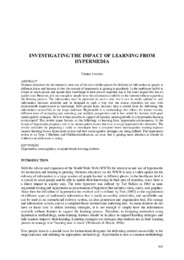Investigating the impact of learning from hypermedia
Abstract
Distance education via the internet is now one of the most viable options for delivery of information to people in different places and because of this the concept of hypermedia is gaining in popularity. In the healthcare field it is crucial to reach people and update their knowledge in their area of expertise due to the direct impact this has on quality care. However, it is not enough to simply have the information available on the internet without supporting the learning process. The information must be presented in such a way that it can be easily updated as new information becomes available and be designed in such a way that the course objectives are met, with demonstrable improvement in knowledge. How people learn becomes then a crucial issue for delivering this information successfully to the target audience. Hypermedia is a methodology that allows for learner control, different ways of navigating and searching, and multiple perspectives and is best suited for learners with good metacognitive strategies. How is it then possible to support all learners metacognitively in a hypermedia learning environment? This review paper focuses on the following: a) learning from hypermedia environments, b) the design of hypermedia programs, and c) he metacognitive issues that arise in using hypermedia for education. The review concludes by proposing a study to investigate how a computer-based metacognition training regimen impacts learning from a hypermedia course and how metacognitive strategies are being utilized. The hypermedia course is on Type 2 Diabetes and Children/Adolescents, an issue that is gaining more attention as obesity in children and adolescents is rising.
